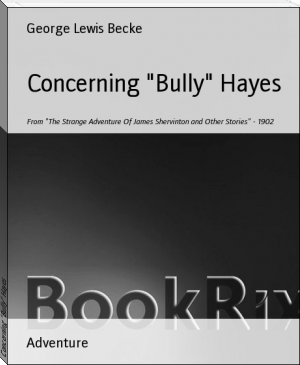Ridan The Devil And Other Stories - George Lewis Becke (free ebooks for android txt) 📗

- Author: George Lewis Becke
Book online «Ridan The Devil And Other Stories - George Lewis Becke (free ebooks for android txt) 📗». Author George Lewis Becke
And for many long, weary months, in the beautiful but fever-ridden Kabaira Bay, he was the only person to whom I could talk; and in time I began to take a liking to him, for I found him, as Parker had told me, 'a thunderin' old cut-throat, but as straight as a die to a white man who acts straight to him.'
SEA FISHING IN AUSTRALIA
'Hi, mister, turn out, please, if you're a-comin' with us,' a gruff voice called out to me one frosty morning in May, and then a hairy, good-humoured-looking face flattened itself against my window pane as the owner sought to peer into the room.
I jumped out of bed, opened the window, and shivered in my pyjamas as the keen morning air rushed in to the warm room. Slaney, the coxswain of the Port Macquarie pilot boat,{*} was standing below me on the grassy side walk, muffled up in his great coat, and carrying a shin of beef in his hand.
* Port Macquarie is a quaint 'old' seaport on the northern
coast of New South Wales.
'How does it look outside, Slaney?' I asked.
'Smooth as glass. Hurry up, please. I've just come from the butcher's, couldn't get any fish bait last night, so bespoke a shin of beef.'
Five minuses later I had dressed, and was running up the hill to the pilot station with my fishing tackle, together with some sandwiches, some bottles of beer, and a tin pannikin, slung in a corn sack over my shoulder--not a very elegant turn-out, but the correct thing for such rough and tumble work as schnapper fishing. At the top of the hill I stopped to give myself breath a minute. An impatient 'Hallo there, _do_ hurry,' ascended to me from beneath, where the smart pilot boat lay rocking on the waters of a little cove, cut out of the solid rock by the labour of convicts seventy years before, her crew of six men standing up to their knees in the water, and holding her steady. Tumbling down the grassy hill at the risk of breaking my neck, I waded out and clambered over the side, and in another minute the crew were bending to their oars and the boat sweeping round a clump of conical rocks that sheltered the boat harbour from the long roll of the Pacific billows. Oh, what a lovely morning, and how the blue ocean glinted and sparkled in the quick warming sun. Away to the southward the high, thickly-timbered coast was broken up by jutting headlands and little, irregularly shaped bays, with steep, rocky shores; and northward a long sweep of beach trended in a curving line for ten miles, till it ended at the purple sides of Point Plomer, beyond which loomed the misty blue outline of Captain Cook's 'Smoaky' Cape.
The wind was from the westward; so we hoisted our lug sail, and headed seaward to the sun. Behind us the noisy Hastings River bar clamoured and moaned unceasingly; for though the sea was smooth, the tide was on the ebb, and rushing fiercely out over the wide but shallow entrance to the river, and short, angry waves reared, and tumbled, and fought the roaring current. But in another ten minutes the noise of the waters became lost in the distance, and we heard, naught but the gentle _lip-lap, lip-lap_, of the boat's cut-water as she slipped over the swelling seas. Three miles out we took our bearings from a mountain called The Brothers, and Camden Haven Heads, and then dropped our anchor in twenty-two fathoms on a rocky bottom.
There is not much 'finnicking' preparation for schnapper fishing, and in five minutes every line was baited, and over the side, and at the bottom, and before another two or three had passed we knew we had struck the right spot, for nearly every one of us felt the unmistakable tug of a lusty schnapper, and then the determined downward pull, strong and steady, which he makes when once hooked. Slaney, who was using a line as thick as signal-halliards, was the first to haul his fish over the side, and drop him, kicking and thrashing like a young porpoise, into the boat; the rest of us, whose tackle was much thinner, were a long way behind him, and Slaney's line was over the side again before our fish were laid beside the first arrival. What a beautiful fish is a ten-pound schnapper--a brilliant pink back, sides and tail, dotted over with tiny spots of a wonderful, gleaming blue that sparkle like miniature diamonds; the bream-shaped head a deep reddish-purple, with nose and lips of palish pink; the belly a pure, shining white. No wonder that Phillip, the first Governor of New South Wales, spoke of the schnapper as 'an exceedingly beautiful and palatable fish.'
For about an hour we continued to haul up fish after fish till our arms ached. The smallest weighed about three pounds, the largest about seventeen pounds, and the average weight of the lot was about eight pounds. Then we knocked off for breakfast. That finished, we lit our pipes and settled down to work again. Alas! a swarm of ugly brown and yellow 'leather-jackets' had arrived on the scene, and before our lines could touch bottom the brutes would either take the bait, or bite off the hook snoozings with their keen, rat-like teeth. In a quarter of an hour we had caught but four schnapper and lost a dozen or more hooks; my own line was bitten through at about five fathoms from the surface--a piece of meat skin had wound itself round it and had been discovered by one of these predatory villains. No wonder that the Samoans and natives of the Tokelau Islands term the leather-jacket _isumu moana_--the sea-rat. However, as leather-jackets make excellent schnapper bait, two of us were told off to fish for them with bream-lines and wire-snoozed small hooks, and we soon had the satisfaction of catching a dozen of the thieves. These were quickly skinned and cut up; then we lifted anchor and pulled southward for about half a mile, knowing we should catch but few schnapper where leather-jackets were.
Our new ground proved a lucky one, for we not only caught some seventy schnapper--some of them truly noble fish--but two magnificent black and white rock cod, a fish whose flavour is excelled by no other in Australian waters. No leather-jackets appeared to disturb our pleasure, and not even the usual murderous shark showed his ugly face, and played the usual game of seizing every schnapper as it was hauled up, and biting it in halves. Only the previous week half a dozen had followed us about from ground to ground, breaking our lines, and taking five out of every ten fish we hooked. Two at last we succeeded in harpooning and killing, and casting their bodies to their friends, who made short work of them and left us alone for the rest of the day.
Schnapper in the winter months, on the Australian coast, retire to the deep water, and can be caught in from thirty to fifty fathoms. They travel in droves like sheep, and prefer to frequent rocky or broken ground. Sometimes, however, they will enter the bar harbours in great numbers and ascend the tidal rivers. Twenty-five years ago they were often taken in nets in the Parramatta River, near Sydney, and were very plentiful in Sydney Harbour itself. Nowadays one is rarely caught anywhere inside the Heads. Steamboat traffic and the foul water resulting from sewerage has driven them to the deep waters of the ocean. One peculiar feature of schnapper fishing on the northern coast of New South Wales is that, be the fish ever so plentiful and hungry, they invariably cease biting immediately, if the wind should change to the east or north-east. Yet on the southern seaboard, from Twofold Bay to Galo Island, they will take the hook during a black north-easter, as freely as they do when the wind is blowing from any other quarter.
From one end to the other of the coast of New South Wales, there is grand rock-fishing to be had by anyone who once is initiated into its mysteries, and is not afraid of getting an occasional drenching from an ocean roller when there is any sea running. Right from the southern boundary of the colony to the Tweed River on the north, are breaks in the long sandy beaches, of rocky coast, which in most places are easily accessible to the fisherman; and the water in these spots being deep close under the verge of the cliffs, the deep-sea fish, such as schnapper, blue and brown groper, the gigantic mottled rock-cod, trevally, king-fish, the great Jew-fish, sea salmon, etc., at certain seasons of the year cruise to and fro about the rocks in extraordinary numbers. But, strange as it may appear, rock-fishing is almost unknown to the average colonial, except those living near the principal ports. The greatest ignorance, too, prevails as to the edible qualities of the many varieties of excellent rock-fish, except the well-known schnapper. The generality of the coast settlers look upon most coloured fish as 'bad to eat,' if not 'poisonous,' and particularly so in the case of the delicious blue groper or blue-fish, the 'leather jacket,' and the scaleless bonito, which latter occasionally visit the shores of the colony in large 'schools,' and take a bait eagerly.
My boyish experiences of rock-fishing in New South Wales are full of delightful memories. Then, accompanied by one of the few surviving members of the Hastings River (Port Macquarie) blacks, my brothers and myself would set out for a week's camping-out on the wild and lonely coast between Port Macquarie and Camden Haven--a stretch of twenty miles or so. Our equipment consisted of some very heavy lines and hooks for the big fish, some fine tackle for beach fishing--for bream, whiting, flathead, etc.--a couple of spears for cray-fish, an old smooth-bore army musket and ammunition (for shooting ducks on the tidal lagoons), tea, sugar, as much bread as we could carry, and a tomahawk. As for tents, such luxuries were unknown to us boys in those days; if it showed signs of rain at night time we could soon put up a bark shelter, and, with a pair of light blankets under us, sleep in peace.
One of our most favoured spots was at Tacking Point, a curious steep-to bluff, clothed on its sides with a dense thicket scrub, the haunt of hundreds of black wallabies and wonga pigeons, and also a large variety, of brown and black snakes, with an occasional death adder. The summit, however, was beautifully grassed, and clear of timber, except for a clump or two of gnarled and knotted honeysuckle trees; and here, after our day's fishing, we would camp, and, lying beside our fire, look out upon the starlit Pacific two hundred feet below. Although only five miles from the little town, we scarcely saw a human being during our many trips. Sometimes, however, some of 'Tommy's' sooty relatives would follow us up, in order to gorge themselves on fish and game, which we shared with them cheerfully.
My first groper was an exciting experience. Descending to the rocky shore very early in the morning with 'Tommy,' we clambered over some huge jagged and wildly-jungled-together boulders at the foot of the bluff, and reached the edge of a large, deep pool of blue water in the rocks, with a narrow opening to the sea. The sides were covered with long streaming kelp and many-coloured seaweed, which moved gently up and down to the rise and fall of the ocean swell. Only in one





Comments (0)